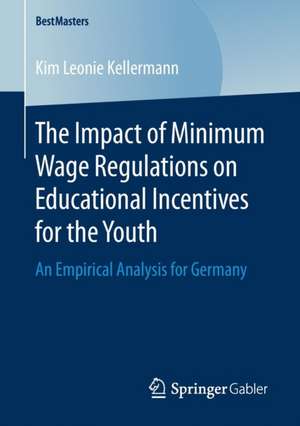The Impact of Minimum Wage Regulations on Educational Incentives for the Youth: An Empirical Analysis for Germany: BestMasters
Autor Kim Leonie Kellermannen Limba Engleză Paperback – 5 ian 2017
Din seria BestMasters
-
 Preț: 362.32 lei
Preț: 362.32 lei - 13%
 Preț: 367.41 lei
Preț: 367.41 lei -
 Preț: 364.14 lei
Preț: 364.14 lei - 5%
 Preț: 403.96 lei
Preț: 403.96 lei -
 Preț: 377.18 lei
Preț: 377.18 lei -
 Preț: 367.05 lei
Preț: 367.05 lei - 13%
 Preț: 364.57 lei
Preț: 364.57 lei - 13%
 Preț: 366.14 lei
Preț: 366.14 lei - 13%
 Preț: 368.35 lei
Preț: 368.35 lei -
 Preț: 391.41 lei
Preț: 391.41 lei - 13%
 Preț: 367.41 lei
Preț: 367.41 lei -
 Preț: 311.76 lei
Preț: 311.76 lei -
 Preț: 396.86 lei
Preț: 396.86 lei -
 Preț: 406.59 lei
Preț: 406.59 lei -
 Preț: 365.66 lei
Preț: 365.66 lei -
 Preț: 394.31 lei
Preț: 394.31 lei - 13%
 Preț: 365.83 lei
Preț: 365.83 lei - 13%
 Preț: 396.42 lei
Preț: 396.42 lei - 20%
 Preț: 366.22 lei
Preț: 366.22 lei -
 Preț: 364.14 lei
Preț: 364.14 lei -
 Preț: 367.05 lei
Preț: 367.05 lei -
 Preț: 346.23 lei
Preț: 346.23 lei -
 Preț: 365.59 lei
Preț: 365.59 lei -
 Preț: 392.13 lei
Preț: 392.13 lei -
 Preț: 251.34 lei
Preț: 251.34 lei - 20%
 Preț: 292.10 lei
Preț: 292.10 lei -
 Preț: 404.05 lei
Preț: 404.05 lei -
 Preț: 393.58 lei
Preț: 393.58 lei -
 Preț: 393.58 lei
Preț: 393.58 lei -
 Preț: 344.87 lei
Preț: 344.87 lei -
 Preț: 410.77 lei
Preț: 410.77 lei -
 Preț: 411.75 lei
Preț: 411.75 lei -
 Preț: 379.30 lei
Preț: 379.30 lei -
 Preț: 411.32 lei
Preț: 411.32 lei -
 Preț: 412.89 lei
Preț: 412.89 lei -
 Preț: 377.73 lei
Preț: 377.73 lei -
 Preț: 378.12 lei
Preț: 378.12 lei -
 Preț: 412.51 lei
Preț: 412.51 lei -
 Preț: 481.79 lei
Preț: 481.79 lei -
 Preț: 377.18 lei
Preț: 377.18 lei -
 Preț: 480.06 lei
Preț: 480.06 lei -
 Preț: 376.04 lei
Preț: 376.04 lei -
 Preț: 382.95 lei
Preț: 382.95 lei -
 Preț: 377.95 lei
Preț: 377.95 lei -
 Preț: 412.68 lei
Preț: 412.68 lei -
 Preț: 376.80 lei
Preț: 376.80 lei -
 Preț: 380.45 lei
Preț: 380.45 lei -
 Preț: 410.17 lei
Preț: 410.17 lei -
 Preț: 410.94 lei
Preț: 410.94 lei -
 Preț: 380.63 lei
Preț: 380.63 lei
Preț: 379.09 lei
Nou
Puncte Express: 569
Preț estimativ în valută:
72.55€ • 75.46$ • 59.89£
72.55€ • 75.46$ • 59.89£
Carte tipărită la comandă
Livrare economică 15-29 aprilie
Preluare comenzi: 021 569.72.76
Specificații
ISBN-13: 9783658164881
ISBN-10: 3658164883
Pagini: 148
Ilustrații: XVI, 148 p. 13 illus.
Dimensiuni: 148 x 210 x 9 mm
Greutate: 0.2 kg
Ediția:1st ed. 2017
Editura: Springer Fachmedien Wiesbaden
Colecția Springer Gabler
Seria BestMasters
Locul publicării:Wiesbaden, Germany
ISBN-10: 3658164883
Pagini: 148
Ilustrații: XVI, 148 p. 13 illus.
Dimensiuni: 148 x 210 x 9 mm
Greutate: 0.2 kg
Ediția:1st ed. 2017
Editura: Springer Fachmedien Wiesbaden
Colecția Springer Gabler
Seria BestMasters
Locul publicării:Wiesbaden, Germany
Cuprins
Evidence of Minimum Wage Effects on Education.- Generally Binding Sectoral Minimum Wages.- The New Country-Wide Minimum Wage.
Notă biografică
Kim Leonie Kellermann graduated from University of Münster with a Master of Science in Economics and works as a research assistant at the Chair of Political Economy of Prof. Dr. Thomas Apolte. Her PhD project focusses on the influence of labor market status on political participation and party preferences in democratic systems.
Textul de pe ultima copertă
Kim Leonie Kellermann analyzes the impact of sectoral minimum wages in Germany on the willingness of youths to undergo apprenticeship training. Using data from the German Socio-economic Panel, the author shows that higher wage floors set small, positive incentives for vocational training in the respective sectors. In case employers have to pay higher wages, they preferably hire qualified workers so that the worse job prospects of the low-skilled outweigh the potential pay increase. In order to preserve these training opportunities, it can make sense for policymakers to exempt apprentices from minimum wages since subminimum apprenticeship rewards are more appealing to firms.
Contents
Target Groups
The Author
Kim Leonie Kellermann graduated from University of Münster with a Master of Science in Economics and works as a research assistant at the Chair of Political Economy of Prof. Dr. Thomas Apolte. Her PhD project focusses on the influence of labor market status on political participation and party preferences in democratic systems.
Contents
- Evidence of Minimum Wage Effects on Education
- Generally Binding Sectoral Minimum Wages
- The New Country-Wide Minimum Wage
Target Groups
- Researchers and students in the fields of economic science and political economy
- Executives and politicians in these areas
The Author
Kim Leonie Kellermann graduated from University of Münster with a Master of Science in Economics and works as a research assistant at the Chair of Political Economy of Prof. Dr. Thomas Apolte. Her PhD project focusses on the influence of labor market status on political participation and party preferences in democratic systems.
Caracteristici
Publication in the field of economic science
